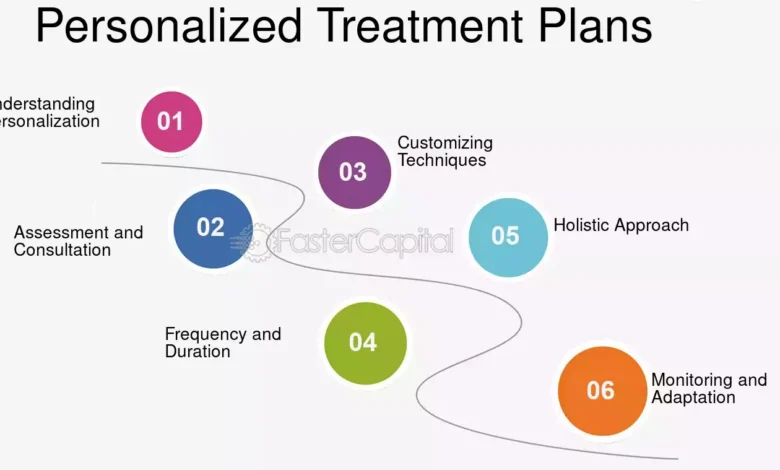Understanding the Shift Toward Personalized ED Treatment Plans

Eating disorders (EDs) can feel overwhelming and misunderstood. If you or someone close to you is struggling, finding the right treatment might seem like an uphill battle. What works for one person may not help another, leaving many stuck in a frustrating cycle.
The good news? Healthcare is moving toward more customized treatments. Studies show that designing plans to fit individual needs improves recovery rates and overall well-being. In this blog, you’ll find out why this approach matters, how it works, and what it means for ED care moving forward.
Ready to learn how these changes could improve lives? Keep reading!
Key Drivers for the Shift Toward Personalized ED Treatment Plans
People are starting to see that one-size-fits-all treatments don’t work for everyone. The focus is shifting toward discovering what fits each individual’s needs.
Advances in Precision Psychiatry
Precision psychiatry focuses on matching treatments to an individual’s specific needs. By analyzing brain function and genetics, experts can identify what works best for each person.
This approach moves away from “one-size-fits-all” methods.
Treatments customized to the mind offer hope where broad approaches often fall short.
Clinical tools now evaluate emotional disorders based on unique symptom patterns. Advanced imaging and tests help detect these early, improving recovery chances.
Recognition of Individual Symptom Profiles
People experience eating disorders differently. One person might struggle with bingeing, while another obsesses over restricting food intake. Recognizing these symptom patterns helps create personalized treatment plans that address specific struggles.
Identifying triggers, such as stress or social pressures, adds another layer of understanding.
Healthcare providers often map symptoms to determine what drives harmful behaviors. For instance, some may focus on body image issues; others may prioritize emotional regulation challenges.
Breaking down these profiles allows for precise interventions customized to each patient’s needs. This targeted approach improves outcomes and supports long-term recovery efforts effectively.
Importance of Addressing Clinical Subtypes
Different eating disorders can appear similar, but they often have unique patterns. Addressing clinical subtypes highlights these differences, aiding professionals in creating personalized treatment plans.
For instance, someone with binge eating disorder may respond better to cognitive-behavioral therapy compared to someone struggling with restrictive behaviors associated with anorexia nervosa.
Overlooking subtypes risks missing vital details such as physical complications or emotional triggers. By identifying the specific subtype, care teams can tailor strategies to meet individual needs.
This accuracy improves recovery outcomes and minimizes setbacks throughout the process.
Factors Influencing Personalized ED Treatment
Every person’s journey with an eating disorder is as distinct as a fingerprint. Developing specific plans requires understanding various elements that shape their experience and recovery potential.
Severity of Eating Disorders
Severe eating disorders can cause life-threatening complications. Individuals with these conditions often encounter immense physical and emotional challenges every day. Symptoms such as critically low body weight, heart irregularities, or organ failure are common in advanced stages.
The effects extend beyond physical health. Intense psychological stress, social isolation, and trouble managing basic tasks can emerge as symptoms deteriorate. Each person’s experience differs significantly, making early intervention essential for recovery.
Physical Complications and Consequences
Malnutrition from eating disorders weakens the body. It disrupts normal heart rhythms, leading to risks like cardiac arrest. Prolonged vomiting can erode tooth enamel and irritate the esophagus.
Hormonal imbalances may cause irregular periods or complete cessation in women.
Over time, persistent restricted eating depletes bone density, increasing fracture risks. Muscle loss impacts strength, including vital organs like the heart. Electrolyte imbalances trigger fatigue, muscle cramps, or dangerous seizures.
Without treatment, physical damage worsens and may become irreversible.
Psychiatric Comorbidities
Mental health struggles often accompany eating disorders, making treatment more intricate. Anxiety and depression frequently coexist with these conditions, heightening emotional distress.
Obsessive-compulsive traits can further complicate recovery efforts by reinforcing inflexible behaviors or thought patterns tied to food.
Trauma histories also increase the risk of psychiatric comorbidities in individuals with eating disorders. Conditions like PTSD may exacerbate symptoms or hinder progress during therapy.
Addressing these overlapping challenges requires individualized approaches that consider both emotional well-being and physical health together.
Social Functioning and Quality of Life
Poor social functioning can worsen eating disorders. Individuals may struggle with relationships, feel isolated, or avoid social settings due to their condition. This isolation often lowers confidence and creates a cycle that is difficult to break.
Improving quality of life means addressing these challenges head-on. Treatment plans should include strategies that assist people in reconnecting socially and rebuilding support networks.
Positive interactions can strengthen emotional well-being, which supports long-term recovery.
The Role of Data and Technology in Personalization
Data shapes how doctors treat eating disorders. Technology helps create specific plans for each person, making care more direct and effective.
Biomarker Collection and Analysis
Researchers collect biomarkers like hormones, enzymes, and proteins from blood or saliva to understand eating disorders better. These biological clues help in identifying unique patterns linked to specific symptoms.
Doctors analyze these markers to predict how someone might respond to different treatments. For example, low dopamine levels could suggest the need for therapies targeting mood regulation.
Biomarkers provide precise insights that enhance patient care approaches without guesswork.
Leveraging Predictive Modeling
Predictive modeling examines patient data to anticipate treatment results for eating disorders. It identifies patterns from previous cases to recommend therapies that may be most effective for an individual.
This approach minimizes trial-and-error in treatment selection, saving time and enhancing health outcomes.
By taking into account factors such as age, symptom severity, and medical history, predictive models develop individualized plans. For instance, someone with severe physical complications might require medical stabilization as an initial step.
These tools enhance care strategies by addressing specific needs with greater precision.
The Role of Artificial Intelligence in Treatment Planning
AI rapidly analyzes extensive data to detect patterns in eating disorder symptoms. It reviews patient histories, biomarker evaluations, and therapy response rates to develop more precise treatment plans.
These algorithms identify the most effective interventions for individual cases by comparing outcomes from similar profiles.
Machine learning tools anticipate potential risks or challenges during recovery. This information assists clinicians in adjusting approaches as patients advance through care. For instance, AI might recommend modifications in nutrition strategies or notify therapists about emerging mental health concerns linked to specific ED subtypes.
Incorporating Patient-Centered Approaches
Patients thrive when care plans honor their voices and values. Listening closely often reveals what truly matters to them.
Understanding Patient Goals and Preferences
Listening to what individuals want in their care can greatly influence treatment effectiveness. Some might aim to restore their relationship with food, while others focus on enhancing physical health or building social confidence.
Asking about these needs helps professionals align strategies with personal values and goals.
Cultural background, family dynamics, and emotional priorities also shape preferences. For instance, someone may avoid certain therapies due to past experiences or prefer treatments that fit into a busy schedule.
By respecting these factors, providers create plans that feel practical and purposeful. Services like Personalized ED care at Jack Health are designed to align treatment strategies with each individual’s goals, preferences, and lived experience.
Addressing Stigma and Enhancing Emotional Support
Stigma often makes individuals with eating disorders feel isolated or ashamed, which can hinder recovery. Encouraging openness about these challenges creates a safe space for honest dialogue.
Talking about symptoms and struggles candidly helps reduce feelings of judgment while motivating patients to seek appropriate help.
Offering emotional support means more than giving advice; it involves active listening and understanding personal experiences without dismissal. Validating emotions, combined with providing care that prioritizes individual needs, builds trust in treatment plans.
Compassionate interaction improves mental health outcomes and reinforces hope throughout the recovery process.
Fostering Collaborative Decision-Making
Building emotional support fosters trust. Trust establishes a foundation for shared decisions in treatment planning. Patients become engaged participants, not passive recipients. Open discussions about goals and concerns enhance outcomes.
Involving patients in decisions honors their values. Motivation to voice preferences enhances engagement. This collaboration improves approaches while concentrating on symptom management and personal needs for improved health outcomes.
Precision Medicine and ED Treatment
Precision medicine adapts treatments to the individual, offering targeted solutions for eating disorders.
Genetic Testing for Tailored Interventions
Genetic testing identifies specific genetic variations associated with eating disorders. These variations can affect how individuals respond to treatment approaches, such as therapy or medications.
For instance, certain genes may impact appetite regulation, mood disorders, or stress response.
Healthcare providers use this information to customize care plans. A person with a genetic predisposition to anxiety might benefit from treatments addressing that condition along with their eating disorder.
This method enhances recovery outcomes by focusing on root causes rather than merely addressing symptoms.
Personalized Hormone Therapies
Hormone therapies aim to address hormone imbalances linked to eating disorders (ED). For example, changes in estrogen or cortisol levels may influence appetite, mood, and stress response.
Doctors can prescribe personalized treatments that focus on these specific hormonal changes.
Low estrogen levels might require specific interventions like estradiol supplements for recovery support. In other cases, treatments regulating thyroid or adrenal glands help maintain energy and metabolism.
These therapies are combined with dietary plans to support physical and emotional well-being.
Integrating Environmental and Family History
Environmental factors and family history can influence eating disorder (ED) risks. Stressful events, societal pressures, or cultural norms often affect behaviors tied to food and body image.
A turbulent home environment or early exposure to harmful dieting practices may further complicate recovery efforts.
Family health patterns provide essential insights for personalizing ED care. Shared genetics might reveal tendencies toward anxiety, depression, or other psychiatric conditions linked to EDs.
Recognizing these influences helps providers develop treatment strategies that address root causes rather than surface symptoms alone.
Interdisciplinary Collaboration in Personalized ED Care
Different specialists collaborate closely to address complex cases of eating disorders. This approach integrates various perspectives for more effective treatment plans.
The Role of Psychiatrists and Psychologists
Psychiatrists and psychologists play a vital role in creating individualized eating disorder treatment plans. Psychiatrists, as medical doctors, evaluate mental health conditions and prescribe medications if required.
They concentrate on addressing psychiatric conditions like anxiety or depression that often accompany eating disorders. By tackling these underlying issues, they help enhance overall outcomes.
Psychologists focus on understanding emotional patterns and behaviors tied to the disorder. Through therapy sessions, they address thought processes influencing harmful eating habits or body image concerns.
Cognitive-behavioral therapy (CBT) is a common approach used to adjust unhealthy behaviors while reinforcing healthier coping mechanisms. Together, both professionals provide crucial assistance for improved mental health strategies and recovery progress over time.
Involvement of Dietitians and Nutritionists
Dietitians monitor eating habits and physical health. They create meal plans based on nutritional needs, medical history, and food preferences. By addressing nutrient deficiencies or imbalances, they design strategies to enhance overall well-being.
Their advice can help prevent issues like malnutrition or severe weight loss.
Nutritionists address emotional connections with food. They emphasize building lasting habits that align with personal goals. This includes practical advice for grocery shopping, portion control, or mindful eating techniques.
Close cooperation between nutrition experts and patients is crucial for achieving long-term success in individualized care.
Effective treatment also calls for collaboration with other healthcare professionals.
Contributions from Social Workers and Caregivers
Social workers provide essential assistance for individuals with eating disorders. They link patients to community resources, organize housing or financial aid, and address family dynamics affecting recovery.
By offering mental health counseling, they help lessen stigma and build emotional resilience.
Caregivers take an active role in daily treatment plans. They oversee meals, promote healthy routines, and support open communication about challenges. Their close relationship with patients enables them to identify subtle changes in behavior that might require modifications in therapy approaches.
Measuring the Effectiveness of Personalized ED Plans
Tracking progress provides clarity on what works. Adjusting methods based on real-time results keeps treatment focused and relevant.
Tracking Treatment Outcomes
Healthcare professionals evaluate changes in symptoms during treatment. They observe enhancements in physical health, eating habits, and emotional well-being. Regular scales or questionnaires monitor progress and pinpoint areas requiring modification.
This approach aids in aligning interventions with changing patient needs.
Data collection also incorporates patient-reported outcomes, such as satisfaction with care or perceived quality of life improvements. These observations refine future plans, ensuring closer alignment with personal objectives.
Accurate tracking contributes to assessing long-term recovery rates, an essential component in individualized care strategies.
Evaluating Long-Term Recovery Rates
Tracking long-term recovery rates helps measure the success of personalized ED treatment plans. Clinicians often assess sustained improvements in eating behaviors, emotional well-being, and quality of life.
These outcomes can reflect how effective tailored strategies are for lasting health changes.
Regular follow-ups allow professionals to identify setbacks or new challenges early. Adjustments based on patient feedback enhance therapy effectiveness over time. Long-term assessments also highlight gaps in care that might need attention for better symptom targeting.
Refining Plans Based on Patient Feedback
Patients often offer valuable input that can refine treatment plans. Clinicians actively listen to their experiences, noting what works or causes distress during therapy. For instance, adjustments might focus on meal strategies if a patient finds specific eating routines overwhelming.
Data gathered from feedback helps identify patterns in struggles or progress. Professionals then make precise changes to enhance outcomes and mental well-being. This collaborative approach ensures care feels more tailored to individual needs and goals over time.
Challenges in Implementing Personalized ED Treatments
Navigating cost, access, and fairness creates hurdles in personalizing ED treatment—read on to see what’s shaping solutions.
Ethical Considerations in Data Usage
Protecting patient privacy is a top priority when using data for personalized ED treatment plans. Healthcare providers must adhere to strict regulations, like HIPAA, to protect sensitive information.
Sharing data without proper consent or security measures risks breaches that can expose personal details.
Bias in datasets also raises serious concerns. If the data used reflects only certain populations, it may exclude others and lead to unequal treatment outcomes. Ethical practices demand creating fair and inclusive databases while prioritizing openness with patients about how their information will be analyzed and stored.
Accessibility and Cost Barriers
High costs often limit access to personalized treatment for eating disorders. Many plans involve sophisticated tools like genetic testing or AI-driven analyses, which can raise expenses.
Patients without insurance or with limited coverage face significant obstacles in affording such care.
Geographical location also adds a challenge. Urban areas may have more options, but rural communities often lack specialized clinics or professionals. This imbalance makes it harder for those outside major cities to receive tailored therapies focused on health outcomes and symptom targeting.
Ensuring Equity in Treatment Plans
Access to personalized care should never depend on someone’s background or income. Providers must consider factors like socioeconomic status, cultural differences, and location when creating tailored health strategies.
Addressing these disparities allows everyone to benefit from precision medicine regardless of their circumstances.
Patients in underserved areas often face greater challenges in receiving specialized support for eating disorders. By incorporating telehealth options and broadening insurance coverage, healthcare teams can close gaps in accessibility.
This approach enhances outcomes by making individualized therapy possible for more people.
Future Directions in Personalized ED Treatment
Experts explore new ways to fine-tune care for diverse needs. Advancements promise better tools to match treatments with individual experiences.
Expanding Research on Precision Psychiatry
Precision psychiatry aims to match mental health treatments to the individual’s unique needs. Researchers now focus on combining genetic data, brain imaging, and biomarkers to create personalized approaches for eating disorder (ED) care.
By identifying how specific biological and psychological traits influence ED symptoms, treatment plans can become more specific.
Research also explores how neural circuits impact behaviors related to EDs. For example, studies show differences in reward processing between individuals with binge-eating disorders compared to restrictive conditions like anorexia nervosa.
This deeper understanding helps improve therapeutic options for better outcomes while addressing variations among patients effectively.
Developing Minimum Datasets for ED Care
Creating minimum datasets for eating disorder (ED) care helps improve treatment customization. These datasets include essential health details, such as medical history, symptom patterns, and lab results.
By standardizing this information, healthcare providers can compare cases effectively and identify the most appropriate interventions.
Data collection also enhances predictive models used in precision medicine. For example, combining genetic profiles with behavioral data allows specialists to anticipate risks or complications early on.
Such tools save time and support faster recovery by aligning treatments with specific needs.
Enhancing Predictive Accuracy with Advanced AI Models
Advanced AI models analyze vast amounts of health data to identify patterns in eating disorders. These systems predict symptoms and treatment responses with higher accuracy by examining genetic, behavioral, and clinical information.
This helps create customized plans that fit closely with individual needs.
AI tools also enhance decision-making for healthcare providers by reducing human error. Predictive modeling highlights potential risks early, ensuring quicker intervention and improved outcomes.
This technology supports ongoing research into the complexities of eating disorder treatments, paving the way for well-informed care strategies based on patient-focused approaches.
Conclusion
Personalized ED treatment plans bring optimism and accuracy to recovery journeys. By focusing on individual needs, they address physical, mental, and emotional challenges effectively.
Data-driven tools make these approaches practical and flexible for real-life cases. This change holds the potential to improve health outcomes and long-term well-being for many struggling with eating disorders.
Resources like genetic testing or collaborative care teams enhance this progress further. Each step toward personalized care is an investment in healthier futures.



